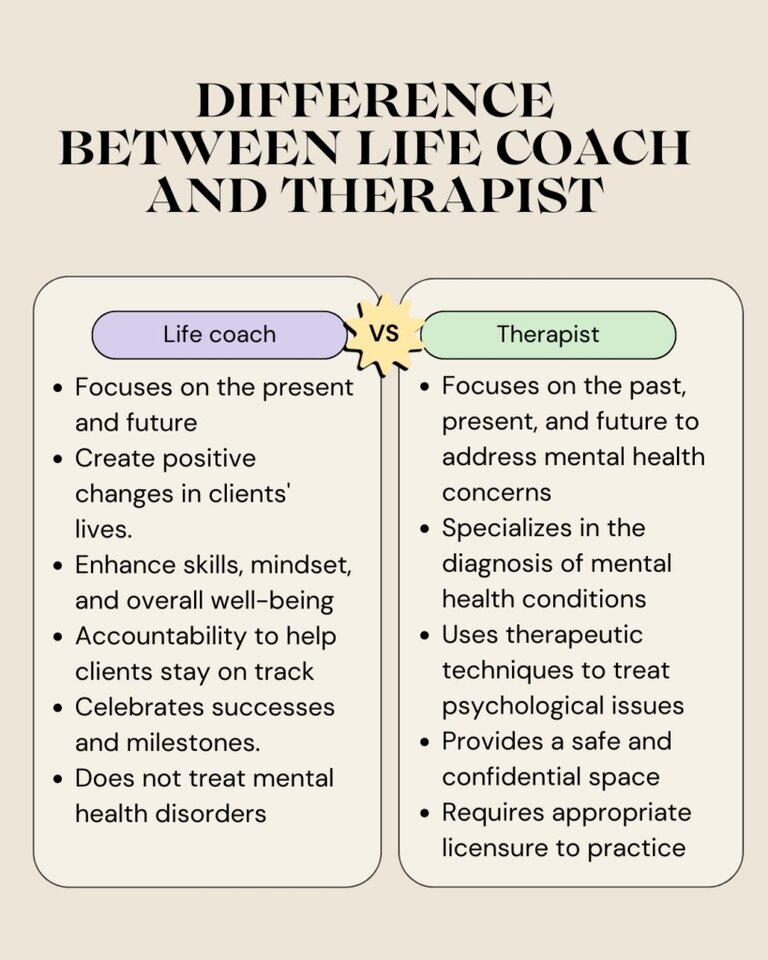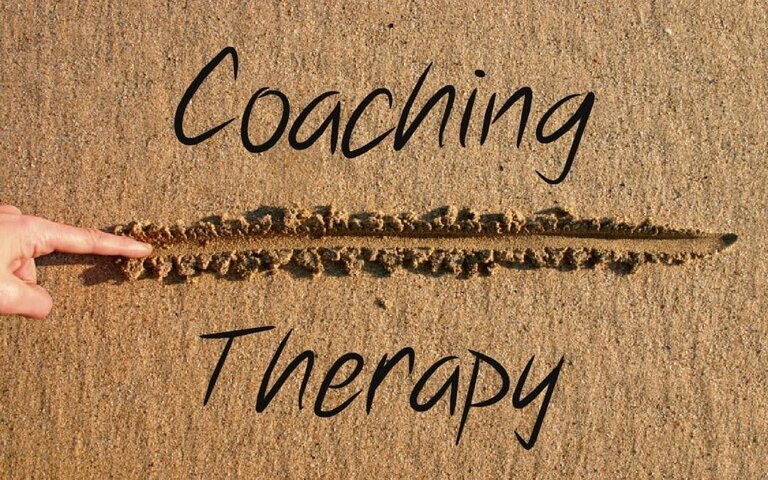Absolutely! While therapists and life coaches serve different purposes, there is significant overlap in their work and goals. A life coach focuses on helping individuals set and achieve personal or professional goals, fostering growth and transformation. Therapists, on the other hand, primarily address emotional and psychological challenges, guiding clients through healing and mental well-being. However, many therapists choose to integrate life coaching into their practice to offer a more holistic approach to personal development. This article will explore how therapists can transition into life coaching, the benefits of combining both roles, and the key differences between these professions.
Life Coaches vs. Therapists: Key Differences
Life Coaches vs. Therapists: A Complete Comparison explores two distinct practices, both focused on enhancing the client’s life, but with different goals and approaches.
- Goals and Focus: Life coaching concentrates on goal attainment and personal development. Coaches support customers in developing methods for success in different areas of life, including career, relationships, or health. Therapy, on the other hand, focuses on treating psycho-emotional disorders such as depression, anxiety, and trauma and restoring psychological health.
- Methods and Approaches: Life coaches use practical and motivational techniques to achieve specific goals, while therapists use psychotherapeutic methods, such as cognitive behavioral therapy or psychoanalysis, to address underlying emotional issues.
- Duration: Coaching is usually medium-term. A coach might work with a client for several months up to one year, depending on the nature of the goals and progress made. The duration is often goal-based, with a clear target or outcome.
Ultimately, the choice between a life coach and a therapist depends on your needs: if you want to develop and achieve goals, a coach is your choice; if you need to cope with psychological difficulties, contact a therapist.

Main differences between life coach and therapist
Approaches in practice
Can a life coach be a therapist? Life coaching is a process in which a professional coach helps you identify and achieve your goals in various areas of your life, such as career, relationships, health, finances, etc. A life coach works with you as a partner who provides guidance, feedback, and motivation. Life coaching focuses on the present and future, not the past. It does not treat mental illness or trauma but rather addresses specific problems and challenges. Life coaching is for those who want to:
- Take initiative and control over their lives;
- Develop their strengths and eliminate their weaknesses;
- Increase their confidence and self-esteem;
- Find a work-life balance;
- Evolve more creative and productive;
- Change their negative beliefs and habits;
- Manage stress and anxiety;
- Feel inspired and optimistic.
Therapy is a process in which a licensed health professional helps you understand and treat your mental health disorders, emotional issues, and trauma. The therapist works with you as an expert who diagnoses, treats, and helps you. Therapy focuses on the past and present, not the future. It is about healing emotional wounds, not achieving specific goals.

Training and Certification, In Practice North America
Therapists' and life coaches' qualifications and certifications vary significantly due to differences in regulation, training requirements, and scope of practice.
Therapists typically hold a degree in psychology, psychiatry, social work, or counseling. Their training includes formal education and supervised clinical practice through internships or residencies. To legally practice, they must obtain a state-issued license, which often requires passing a standardized exam and completing ongoing continuing education. This rigorous process ensures that therapists are equipped to diagnose and treat mental health conditions, provide evidence-based interventions, and work within legally defined ethical frameworks.
Life coaches, on the other hand, are not required to follow a standardized educational path or obtain a state-issued license. Instead, they receive training through various coaching programs, which differ in depth, focus, and accreditation. Many life coaches obtain certifications from coaching organizations such as the International Coaching Federation (ICF), the European Mentoring and Coaching Council (EMCC), or the Center for Credentialing & Education (CCE), which provide industry-recognized credentials. However, the coaching industry remains largely unregulated, meaning that life coaches are not required to meet the same legal and clinical standards as therapists.
While therapy is highly regulated to protect client welfare and ensure professional competency, life coaching is a more flexible field. It allows practitioners to specialize in various personal and professional development areas without the legal constraints of healthcare professions.
Can a Therapist Be a Life Coach? Pros and Cons
The therapist can be a life coach, combining therapeutic skills with coaching techniques.
Pros: They bring a deep understanding of human psychology, offer emotional support, and can address both mental health and personal growth.
Cons: Balancing both roles can blur boundaries, potentially leading to ethical dilemmas or conflicting approaches.
Pros: Why Therapists Should Become Life Coaches
Benefits of Coaching:
- Focus on the Future: Coaching aims to achieve specific goals and objectives that stimulate the client's active actions.
- Partnership and Collaboration: Interaction with the coach promotes the development of partnership relations, where the client actively participates in his/her development.
- Result-oriented: The coach helps to define specific goals and create strategies for achieving them.
Benefits of Therapy:
- Understanding the Roots of Problems: The psychological approach allows for a deeper understanding and solution of problems, considering their mental context.
- Emotional Support: The psychologist can provide emotional support and help develop strategies for overcoming stress and difficulties.
- Therapeutic Approaches: The psychologist can use various therapeutic techniques to develop consciousness and change negative patterns.
Although coaches and psychologists have differences, their approaches can complement each other. The choice between them depends on each client's needs and personal development goals.
Who to choose: Therapists or Life Coach or Therapists who is also a Life Coach
Choosing between a Therapist, Life Coach, or a Therapist who is also a Life Coachy depends on your needs and goals. Here’s a breakdown to help you decide:

1. Consider choosing a Therapist if:
You want to address mental health issues: Emotive or psychological problems, such as anxiety, depression, trauma, and grief, are issues a therapist can help with, including diagnosis and therapy using evidence-based therapeutic techniques, such as cognitive behavioral therapy and psychodynamic therapy.
You need clinical intervention: Therapists are licensed professionals who can offer psychotherapy and deal with complex psychological conditions.
You want to understand past experiences: Exploring your past is often necessary for therapy, as this can explain your present and help you cope with deep emotions and unresolved issues.
2. Consider choosing a Life Coach if:
You want to engage in personal growth and the accomplishment of set objectives. The life coach will help you set clear, reachable goals and thus motivate you toward objectives. They are ideal for clients who want to improve their careers, relationships, or self-confidence. You want a more forward-looking approach: generally, life coaching deals with how to make plans and move forward rather than trying to resolve deep-seated emotional issues.
You want accountability and motivation. Life coaches are your partners in success, keeping you on track, supporting you, and encouraging you.
3. Choose a Therapist who is also a Life Coach if:
You want both therapy and focused coaching. Although you may be struggling with a mental health issue, you wish to work on personal development and goals. A therapist-life coach can offer both therapeutic support and coaching strategies.
You want a holistic approach: If you need to resolve past emotional difficulties while focusing on building a better future, a life coach can help balance both areas in one process, although the practitioner should have training in both disciplines.
You want professional support with some flexibility: If you prefer having one person who can transition from helping you with emotional issues to pushing you toward your future goals, a life coach might be the way to go.
Choose Your Professional Quickly
Ready to take responsibility for your life? From seeking help with a therapist to working your goals out with a therapy life coach, we have the right professional to support you. Check out our page today and connect with either therapy and life coaching who can understand your unique needs and help you forge ahead with confidence. Take the first step in personal growth, emotional healing, or even realizing your dreams-find your perfect match now!






